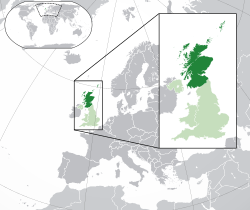Scottish independence

Scottish independence (Scottish Gaelic: [Neo-eisimeileachd na h-Alba] Error: {{Lang}}: text has italic markup (help); Scots: [Scots unthirldom] Error: {{Lang}}: text has italic markup (help)) is a political stance that wants Scotland to leave the United Kingdom and be an independent sovereign state.
Scotland has not been an independent country since the Acts of Union 1707. At that time, the kingdom of Scotland united with the kingdom of England to make the United Kingdom of Great Britain.[1] Scotland and has been unified with England ever since.
Ideas of an independent Scotland were first made in the 19th century but were initially only calls for home rule within the United Kingdom. Ideas of a fully independent Scotland have became bigger in the late 20th and 21st century. The Scottish National Party, a party that wants full independence, have won a large number of seats in recent elections, showing the growth of the idea.
In September 2014, a Scottish independence referendum was held. 1,617,989 (44.7%) voted for independence and 2,001,926 people (55.3%) voting to stay as a part of the UK. But, since this referendum, the nationalist and independence movements have continued.
The growth in the idea has resulted in increased Welsh independence movements and also English independence movements.
Scottish Independence Media
Scotland independence march in Glasgow in 2019.
A treatise of union of the two realmes of England and Scotland by the English historian Sir John Hayward, 1604
The Debating chamber of the Scottish Parliament, commonly known as Holyrood.
Survey of the importance of holding a referendum, carried out by the BBC in April 2011.
UK Prime Minister David Cameron in Edinburgh to discuss the new powers that Scotland would obtain through the Scotland Act 2016
Following the 2021 election, the SNP and Scottish Greens agreed a power sharing agreement known as the Bute House Agreement, giving the SNP government a majority in the Scottish Parliament
The Scottish Government began publishing independence prospectus papers, Building a New Scotland, under First Minister Nicola Sturgeon in 2022









